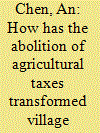| Srl | Item |
| 1 |
ID:
141096


|
|
|
|
|
| Summary/Abstract |
The abolition of agricultural taxes (AAT) (2005–2006) significantly changed the workload, finance, authority and functions of village governments. In agricultural regions, village cadres had their agendas reset, with the top priority switching to the search for new revenues through “attracting investment” (zhaoshang yinzi). This new agenda fits perfectly with the demands of township governments. Facing an even worse fiscal crisis, township governments attempted to cover up their deficits using village revenues. The shared stake in increasing revenue has resulted in the convergence of the functions of township and village authorities. However, the change in the function of village governments has increased the disengagement between cadres and villagers.
|
|
|
|
|
|
|
|
|
|
|
|
|
|
|
|
| 2 |
ID:
184054


|
|
|
|
|
| Summary/Abstract |
This study examines whether governments use the revenues accruing from agricultural taxes to finance their arms imports. This policy issue is especially of importance for developing countries as the decision to finance the acquisition of arms using agricultural taxes will create a trade-off between two important policy objectives in these countries: on the one hand, ensuring food security for the population at large and, on the other hand, improving national security. Our empirical findings generally suggest that governments in developing countries partly finance their arms imports by increasing the agricultural tax rate. It turns out that the magnitude of this effect relies to a certain extent on country-specific factors such as whether a country has to deal with a security threat, strength of the democratic institutions in place, and the regular occurrence of major shocks to the domestic food provision. Also, taxes on cash crops intended for export are more likely to be used for financing the arms imports compared to taxes on import-competing or subsistence crops.
|
|
|
|
|
|
|
|
|
|
|
|
|
|
|
|